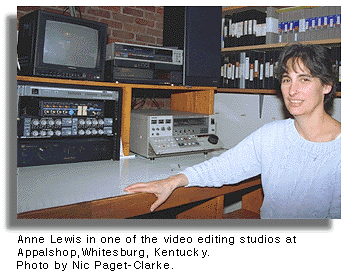 Video documentary maker Anne Lewis came to eastern Kentucky 23 years ago to help make a film (associate director on Harlan County, U.S.A.). She never left. In the time that she has been there she has made 40 videos about rural life and mountain culture. The central body of work made in this time is a series of videos for TV called Headwaters. A set of eight one-hour videos is currently available to PBS stations around the country. The series features people who work to keep their communities strong by carrying on tradition, teaching the children, and fighting for civil rights, health care, a clean environment, and sustainable economic development. (For more info email Appalshop@aol.com). Video documentary maker Anne Lewis came to eastern Kentucky 23 years ago to help make a film (associate director on Harlan County, U.S.A.). She never left. In the time that she has been there she has made 40 videos about rural life and mountain culture. The central body of work made in this time is a series of videos for TV called Headwaters. A set of eight one-hour videos is currently available to PBS stations around the country. The series features people who work to keep their communities strong by carrying on tradition, teaching the children, and fighting for civil rights, health care, a clean environment, and sustainable economic development. (For more info email Appalshop@aol.com).
The following interview with Anne Lewis was conducted by Nic Paget-Clarke in Whitesburg at Appalshop, a rural arts center. The interview was transcribed by Jean Yonemura.
In Motion Magazine: How do you make videos?
Anne Lewis:
I work a lot differently than most television producers. We began an experiment that we called community-directed television. I don't go in as a television producer from somewhere else, make a film about people then go off, cut it, and never see them again. What I've been really interested in is creating partnerships with people who are working on an issue. Then together we work on that piece. This is a very different kind of relationship, and I think it results in very different work.
In Motion Magazine: How do people respond to this method?
Anne Lewis:
When you ask how do people respond to the work -- to a certain extent I have to tell you I don't know. They're involved in the making of the video, and they're responding all along. That response is incorporated into the work.
I can give you an example. We were working on a piece called Yellow Creek. It was the story of a community, and it's cut that way. A whole bunch of people tell the same story about how they found out that this little creek that runs through their community was killing them. It's one person after another talking about it -- a worker in a factory there, a woman who lives in that community, a man who developed into the organizer who is a railroad engineer. They're describing the story of their community and of how they decided to fight back.
At the time that we began filming, the community had decided that the only way to get anywhere was to basically take over the city government. There weren't really very many people talking to them in the current administration of the city, as you can imagine. So I called up and got an interview with the commonwealth attorney, at the city level. I told them who I was working for. I told him I was doing a documentary and he agreed to give me an interview.
The first thing I did was ask the folks at the grassroots level, 'what should I ask this guy?' They gave me ideas. I went and did the interview and showed it back to the folks. We did some more interviews, they responded to some of the ideas that he had put forward. And in the final piece, they're edited together. You can really see the difference in viewpoints between what he says is going on and what they say is going on. It's very cooperative.
In Motion Magazine: How do the themes develop?
Anne Lewis:
There are certain areas that I'm very interested in. I'm very interested in labor unions, and working people. I'm interested in education, and the rights of women and minorities. Right now I'm working on a piece about community organizing in a very difficult situation.
In Motion Magazine: What is that video about?
Anne Lewis: You know there's a desire to tell the success stories. And I do really want to talk about how wonderful things are because it feels like everybody else is saying 'oh god, everything's awful down here.' You know? You really want to do something that feels, that tells positive things about people here and about the community that's here.
But the fact of the matter is that there have been a number of failures, and those failures are important failures because I don't think we are as isolated as a lot of people like to think we are. There is a relationship between what goes on here and what goes on in the rest of the country and the rest of the world. I think for some people here, and for some communities here, life has become unhappy.
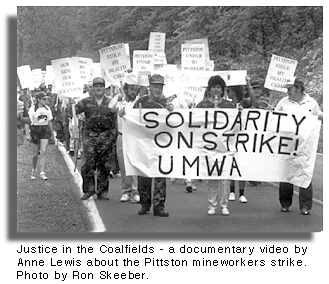 I'm looking at one of those communities which had a wonderful success about ten years ago, and has not had a repetition and building from that. That's very hard. I'm looking at one of those communities which had a wonderful success about ten years ago, and has not had a repetition and building from that. That's very hard.
The town of Trammel had been owned by a coal company. And before it was sold everyone was laid off. This was not a well-to-do coal company. This was not U.S. Steel, a big coal company. The town was always somewhat of a marginal coal community, totally based on ownership by the company.
As time went on, the company wound up not mining coal. It became an estate. The estate decided to sell the town. Just sell it! You had maybe a hundred families, many of whom had been there for generations, and the company decided to auction the town.
This was nine years ago, in '85. They stuck auction signs up on every house in the town. People had about a month's notice. Together with every religious resource and every progressive in the area people began raising money frantically. They formed a homeowners association and actually managed to buy back their own houses. They set up a trust so they still had to pay their rent, but at the end of paying their rent they would own their house.
We videotaped the auction, and you can imagine what that was like. I mean, it was incredible! At the end of the auction, everybody was saying 'come back in a year and you won't know the town. We're going to do all these things!'
So I kept waiting for something else to happen. I could come back and say, 'not only did they have this wonderful victory, but look at what they've done!' Well, that hasn't happened.
Now it's a question of how do I tell that story in a way that's meaningful?
You know, there's a catch phrase now of something we really feel in this region -- internalized oppression. You take the outsider impression of you and turn it in on your own self. I think it's a very real thing. It sounds very abstract and I'm probably not communicating it very well, but you certainly see it in children around here. The perception is that everyone from here is dumb or something. They say well, I'm dumb and I'm not going to amount to anything. If the perception of me is kind of dumb and drunk and redneck and totin' a gun, well, by god, that's what I'm going to be like!
You see it manifested in a lot of ways, and I think you also see it in terms of communities -- poor communities, and the relationships between people in those communities. I think it leads to a level of mistrust.
In this town of a hundred people five of the inhabitants of have jobs. How does that community deal with the sense of uselessness and hopelessness? Being on welfare, being dependent on a check -- is just the same thing as being dependent on the coal company. It's worse, because you don't even have your labor to bargain with. It is basically a welfare camp. By welfare, I mean they were in a situation where they're receiving third party payments. A lot of the people are elderly people living on black lung compensation, with mining disease and occupational diseases. People living on social security. That's the situation today in Trammel.
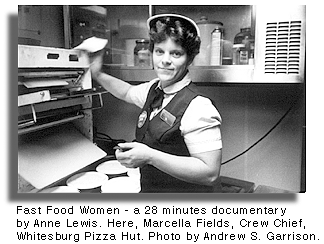 In Motion Magazine: Is that a reflection of the whole region, or is it particularly bad in Trammel? In Motion Magazine: Is that a reflection of the whole region, or is it particularly bad in Trammel?
Anne Lewis: I think there's a little Trammel in all of us. We look at people and we see wonderful people with wonderful ideas and a wonderful sense of freedom and liberty and self-determination -- and we don't see the basic conditions they live in.
Or, we see the conditions they live in which may be dire poverty, depression, alcoholism, drug abuse, violence, lack of employment, lack of medical care, -- we look at those conditions and we don't see the people. I think that we have to be able to see both in order to do anything.
For people who are interested in social change, that's the lesson that I'm learning. In a hard way, trying to work with this material, is how do you separate those two things and look at both of them honestly. A lot of the work that I've done has been about failure, but I hope that even in those failures, there's a victory of spirit.
In Motion Magazine: So what does all this say about life in the U.S., about democracy?
Anne Lewis: There are a couple of things that might be said. One thing that could be said is that there are a number of people who have no experience of democracy. Thomas Jefferson said, democracy takes work. Democracy is not something simple and it's not something abstract. It is in the way we live our lives and in our involvement. Democracy has to do with how do we work together.
I'm not a great believer in capitalism. I don't think that there's anything in it that inherently creates a democratic society. There's nothing in the business climate and in capitalism that in any way protects workers, that protects poor people. That's not the intent. The intent is to make money.
So when you have a society that has somehow got democracy and capitalism confused with each other, I think that you have a lot of illusions, a lot of the time.
I think that I enjoy a great deal of freedom, personally. You know, I have quite a bit of freedom of speech, although the access to speech in my medium is quite limited. You can't get onto the tv very frequently.You can't get the funding because it's political work. But when I look at a place like Trammel, the amount of freedom that those people have and the amount of democracy that they realistically have ... . They are at the mercy, for example, of their county officials who could shut off their water system tomorrow because only half the town is paying the bills, because they can't pay their bills. They're at the mercy of the welfare system which could cut off their checks tomorrow.
In addition, their health care is always in jeopardy. None of them have insurance, that I know of. The ones that don't have cars, their access to the medical system is very limited. There's only Sister Bernie and her health wagon. Their ability to have their own children is even threatened. I heard recently of a foster child who was going to be raised in Trammel, and a social worker got up in court and said 'I don't think Trammel is any place to raise a child.'
Basic human rights that we think we enjoy in this country, are not there for those people.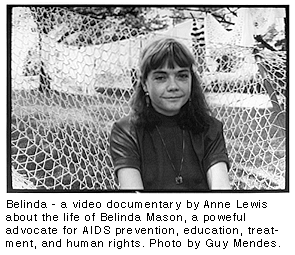
Everyone's stuck until they decide not to be, and why those particular people got more stuck than others, is partly in the nature of the economy of this region. In this region we have a coal economy, an economy oriented around an extractive industry, be it coal or logs, or people.
When you talk about Appalachia, it's a very similar circumstances to inner city communities, minority communities. I think that the association hasn't been made because most people here are white, because somehow there's a romanticized notion about what life is like here. There's this image of a little log cabin with the woman quilting on the porch, and nice music, and back to the land. But when you look at the statistics, it's very similar to Detroit. Unemployment figures, children-living-in-poverty figures, and health problems are similar here to those in inner city communities. Every county has its Trammel. Everyplace has the community that's at the bottom, or people perceive it as at the bottom.
There's a little bit of Trammel everywhere in the coalfields. Coal companies have killed a lot of people and they've destroyed a lot of people, and what benefit they've brought to this region I think is really questionable. They've destroyed an awful lot of the environment. They're not leaving a lot of infrastructure of any kind for folks to build on. There's a lack of an infrastructure of a decent system that people can live on, to continue after the company's gone. Coal -- I hate the stuff, I really do.
In Motion Magazine: Besides the Trammel piece, what have you worked on recently?
Anne Lewis: I've done two pieces in the last year that I'm really excited about. One of them is about the Pittston coal miners' strike (Justice in the Coalfields). In the video I use the strike as a way of looking at the question of a social contract. What is the relationship between companies, workers and the government.
What we saw in that strike was a violation of the social contract and the mass uprising to fight that violation. There were more than 4,000 arrests during the Pittston strike and a climate of real civil disobedience. This was something very important that was not covered very much at all in the national media.
Another thing about the Pittston strike that I think make it an important story to tell is that it was symptomatic of right-to-work states in this country. Right-to-work laws came out of the Taft Hartley Act and basically mean you can't have a closed shop. The fact that there are states in the country that have right-to-work laws certainly impacts workers in states that don't have those laws. There's been a real flight to the South which now ofcourse NAFTA is continuing on further south to Mexico.
This video also deals with the question of failure or victory. What the tape ends up saying is that 'no we haven't won, but this was a victory.' People did have their health benefits restored. That's a wonderful thing that happened. But the end result, unfortunateley, was many of the working miners lost their jobs not due to the strike but due to the general economics of the country and the world. It's a not a sugary ending at all.
I think we are always left looking at those basic conditions that impact our lives. If there are bad conditions and bad government and bad politics and so forth, impacting our lives, we can't say we really won something in the long term -- until we change those basic conditions.
But there was a real victory in there. There are uplifting things in the tape, -- people standing up for themselves and forcing others to treat them decently. Also, this was a strike that ended in 1990 - it's not old history, a victory in the '30s. It's a current victory.
The other new piece is called Evelyn Williams. It's about an 80-year-old African American woman who lives near here. She has been an activist all her life. It's her life story. What for me is interesting about it is there's a myth around here that there's no racism in the mountains. Let me see, how does it come up? When coal miners leave the mine -- they all look the same anyway. And another is: there aren't any Black people here - so why are we worrying about racism.
The population in Letcher county is around 28 - 29,000 people. There's about 120 Black people. I was interested in that because while I was hearing this kind of mythology there have been four KKK marches in a 50 mile radius in the past 10 years. For me it was a way of exploring that history.
There has been real discrimination here, mainly at the hands of the companies -- in the coal camps, in the living situations. Evelyn describes that and it is very interesting. After we finished the video I took some clips of the tape to show at a meeting and Evelyn went with me. The standard question was - sure things are bad now but aren't they a lot better than they used to be? Evelyn looked at the person and said 'no - they are not better.' It's very unusual for an African American woman to say that to a group of white people because everyboy wants to pat themselves on the back. Several African American women in the group came up to her afterwards and said it was so wonderful to hear that for a change, to hear somebody be very direct. She's very direct.
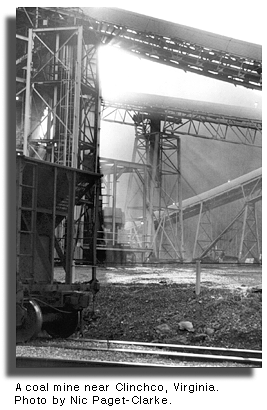 In Motion Magazine: What is the sigificance of community-directed video and why do you do what you do? In Motion Magazine: What is the sigificance of community-directed video and why do you do what you do?
Anne Lewis: Being on television is a very validating experience -- it is validating of people and their culture and of issues.
I was hired to do a training of folks all over West Virginia -- people fighting toxics, creating food banks - I was hired to teach these folks how to portray themselves when the local news came to call on them.
I sat down and began looking at what was on the local news. I broke it down in terms of women, minorities, white men, age groups, class, authority figures. It was 90% white, male authority etc. That you could predict. Then I tried to figure out how much time in the typical news broadcast was spent where you actually heard anybody talking, other than the reporter. Also, how much time was spent with nobody talking and you actually experiencing what was happening. The max was three minutes with somebody other than the reporter talking at all, anybody - out of the half hour. Actualities -- the time that was spent where you didn't have anybody telling you what to think -- were less than a minute.
You like to think that having some kind of representation in something other than sound bites is fairly important for people, for both the people who are on the television and the people who are watching them. People can have one of the few opportunities to see their neighbors, their families, people that they know or understand being represented in some kind of decent way.
I think it is important that we, in fact, don't see anything about reality on television most of the time. I think television is very important in this country. It is the way that many people get their news, that many people understand the world. Content on television is very important for social change. In that way I think what we are doing helps.
But also it is just a tool. I don't think that any kind of media really is going to be the one factor that makes the difference. I don't see my work as something that is really separate from the larger picture.
For example the campaign around the Broadform Deed. The Broadform Deed was a very unjust system under which a coal company could come and completely destroy the surface of the land that you own because they owned the minerals (below) -- without your permission - just come on and take it. This went on in Kentucky until 1988.
There was a grassroots group, Kentuckians for Commonwealth, who were fighting this issue. We got involved with them, documenting them and their issue. The piece that we did became a part of their grassroots campaign. There you can see a direct kind of impact. I don't think you can separate the documenting from the issue.
Sometimes video can be wonderful as something that goes along with a person that's talking. Sometimes it's an added tool in the whole process of organizing. A lot of people don't like the word organizing anymore, but I think organizing is important. It's a part of what makes us human beings. We are organizers and sometimes that can be for the common good. I see it as a tool in the process, in informing people, in helping them come together for a common purpose.
I think of my work as the tail end. I'm following the movement trying to help it along, trying to spread it's meaning. I'm reflecting some of what is happening and trying to make it more understandable.
|
 Video documentary maker Anne Lewis came to eastern Kentucky 23 years ago to help make a film (associate director on Harlan County, U.S.A.). She never left. In the time that she has been there she has made 40 videos about rural life and mountain culture. The central body of work made in this time is a series of videos for TV called Headwaters. A set of eight one-hour videos is currently available to PBS stations around the country. The series features people who work to keep their communities strong by carrying on tradition, teaching the children, and fighting for civil rights, health care, a clean environment, and sustainable economic development. (For more info email Appalshop@aol.com).
Video documentary maker Anne Lewis came to eastern Kentucky 23 years ago to help make a film (associate director on Harlan County, U.S.A.). She never left. In the time that she has been there she has made 40 videos about rural life and mountain culture. The central body of work made in this time is a series of videos for TV called Headwaters. A set of eight one-hour videos is currently available to PBS stations around the country. The series features people who work to keep their communities strong by carrying on tradition, teaching the children, and fighting for civil rights, health care, a clean environment, and sustainable economic development. (For more info email Appalshop@aol.com).


 I'm looking at one of those communities which had a wonderful success about ten years ago, and has not had a repetition and building from that. That's very hard.
I'm looking at one of those communities which had a wonderful success about ten years ago, and has not had a repetition and building from that. That's very hard. In Motion Magazine: Is that a reflection of the whole region, or is it particularly bad in Trammel?
In Motion Magazine: Is that a reflection of the whole region, or is it particularly bad in Trammel?
 In Motion Magazine: What is the sigificance of community-directed video and why do you do what you do?
In Motion Magazine: What is the sigificance of community-directed video and why do you do what you do?